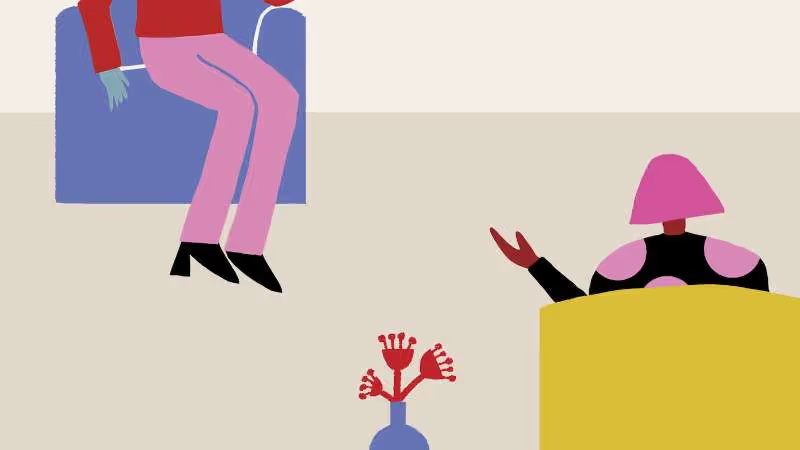“What’s a podcast?” I asked over tea at Morandi in New York City. Across from me was Jesse Baker, a radio veteran who had been in the trenches at NPR before moving to Audible to become the Vice President of Original Content, as well as June Cohen from TED. At the time, I was consulting for the Showtime series The Affair, a “he said/she said” kind of story where viewers experience the drama from each character’s unique perspective. Jesse and June believed that my work on the show could translate well in an audio-only format—relationship stories as told by partners with different recollections, which I would unpack and analyze. There would be story arcs and character development. There would be nothing to see or touch or taste. One would simply listen and let their mind fill in the blanks. A podcast, I was learning, was a sensual experience. Any detail beyond sound would be up to the listener. That intrigued me.
But I didn’t want to do a he said/she said show. It was a great idea, but truthfully, the highly-orchestrated narrative isn’t half as interesting as what really happens inside the office of a couple’s therapist. Inside my office, couples don’t just offer two conflicting points of view of the same stories. Nor is it how we regale our friends with our relationship tribulations behind our partners’ backs to blow off steam. Instead, it’s the stories that we recount in conjunction with our partners. In the therapist’s office, the real dance of couples is laid bare: each partner’s story shapes the other’s, and the more one partner emphasizes their side, the more the other partner digs into their own. The listener shapes the speaker and the speaker shapes the listener. Suddenly, or not so suddenly, two people who have shared so much in common are incapable of seeing into each other’s eyes. Standing on opposite shores, the sea of bitterness that has formed between them feels unbridgeable. Many of the people I work with want to fight for their love, if only they could stop fighting.
Back then, as Jesse tells it, I quietly listened to her pitch, didn’t say much, and at the end of the meeting, I got up, put on my bicycle helmet, and said “You can come to my office. We will record real sessions, with real couples, but they cannot be my patients. We’ll have to find them.” I wanted to do something bold and creative with my craft, but it could not interfere with HIPAA compliance. Couples would need to apply with the knowledge that their three hour therapy session would be recorded for a public-facing project, and that their anonymous participation would mean that, when the three hours were up, we would never see each other again.
Step into my Office: Inviting the Public into Couples Therapy
Where Should We Begin? was conceived with that very idea—where should we begin? On one hand, the podcast was a version of a training practice I had been doing for three decades—recording real life therapy sessions and playing them back for my teachers, as part of their supervision of me, and for my students as part of their learning process. On the other hand, I had only just learned what a podcast even was, remember? I had known for awhile that I wanted to open the office and take therapy into the public square, but this would be the opposite: taking the public into the office. Therapy is so often a practice of privilege, accessible and affordable to very few. This would be an opportunity to democratize therapy and to empower couples to embrace the reality of relational dynamics so that they could improve their own.
Plus, in a moment of increasingly performative displays of perfect coupledom on social media, the podcast would be 100% the genuine article. From a very young age, we are conditioned to form unrealistic images of relationships. As we grow up, fairytales are replaced by filtered photos of endless honeymoons. Romantic comedies and dramas beam to us from an alternate universe which promises that any relational dilemma can be solved in ninety minutes. That fallacy breeds feelings of isolation. Because of this, it’s even more important that we know what other peoples’ relationships are really like. Hearing others’ experiences can help us with our own. And what if we could spend thirty minutes on the train or in our car, or even together, late at night after the kids are asleep, and listen to how real couples’ navigate the most complex challenges of partnership? How could that transparency be not simply an exercise in voyeurism, but an exercise in collective relational healing?
We would start the way all my sessions start: with couples filling out an intake questionnaire before coming to meet in my office. But this time, Jesse and her talented team would conduct pre-interviews, select the couples, record the sessions, edit the audio, and use their magic to transform it all into engaging and informative episodes. None of us knew what we were getting into, but after one trial session, we never looked back. For our very first attempt, Jesse and our producer/sound designer, Paul Schneider—who has acted as midwife for WSWB since those early halcyon days of experimentation—rigged up microphones and then sat outside the door in my waiting area.
“Paul and I listened to the session for three hours, and cried and texted our partners,” Jesse told me recently. “And we were just like, whatever this is, this is magic. Forget the show I wanted to make. What’s happening in this office, the world has to hear.”
Listening to Couples Therapy with an Introspective Lens
Four years on, Where Should We Begin? has been listened to by millions of people all over the globe. The podcast is ever-evolving in its breadth: part therapy, part educational technology, part journalism, and part storytelling. To me, it’s also a public health campaign for relationships. I think people come for the look into another’s world and stay for what they learn about their own. The more deeply they listen, the more they see themselves in their own mirror. The more they hear real couples navigating real problems, the more they feel empowered to heal their own. Whether one listens alone, or in parallel with a partner or friends, I encourage people to use the podcast as a map for exploring difficult relational conversations. Pick a few points you want to discuss and bring it into your relationship or your circle of friends. Consider taking it a step further by exploring your own intimacy inventory and sharing your answers with one another.
After years of fine-tuning our methodology, season four has arrived. In our most racially, economically, sexually, and culturally diverse season yet, it is our hope that everyone can see themselves in the extraordinary people who have entrusted us with their stories. This new season is all about the ins and out of love as experienced by these partners: the husband and wife who met as religious teens and married as virgins now grappling with a desire to open their marriage; interracial couples dealing with racism in their extended families; a woman struggling to come out and her partner who is tired of waiting; a chronic philanderer and the woman who wants to know if he’s in or out for good; a couple yanked out of innocence when his erratic behavior is finally identified as bipolar disorder; and so many more. Beginning June 25, you can listen to the series as well as read extensive show notes for each episode here.
Each episode contains a human story wrapped up in a sonic context. Paul has done an exceptional job of translating my love for composers such as Maurice Ravel and Erik Satie, as well as the nuanced sounds of both anguish and progress in the room, into operatic soundscapes that reflect the conversations taking place. Listeners often tell me that the radical intimacy and vulnerability they experience in Where Should We Begin? “almost feels too close,” as if they “shouldn’t be there, but can’t leave.” To them I say, sit with the feeling and then go deeper. Feeling too close is a sign that you’re getting closer to why the podcast may have piqued your interest in the first place. Pay attention to that.





.svg)





